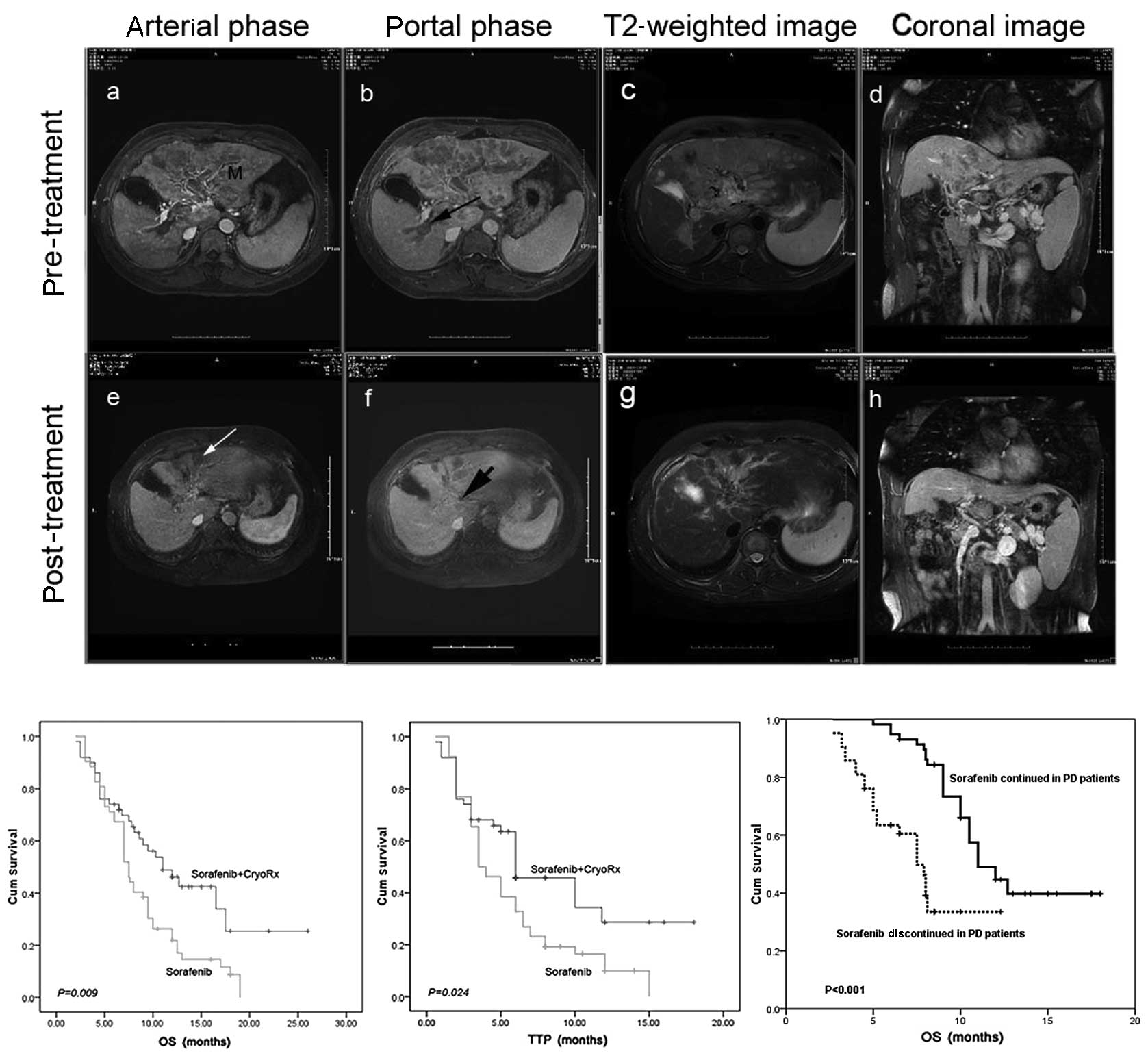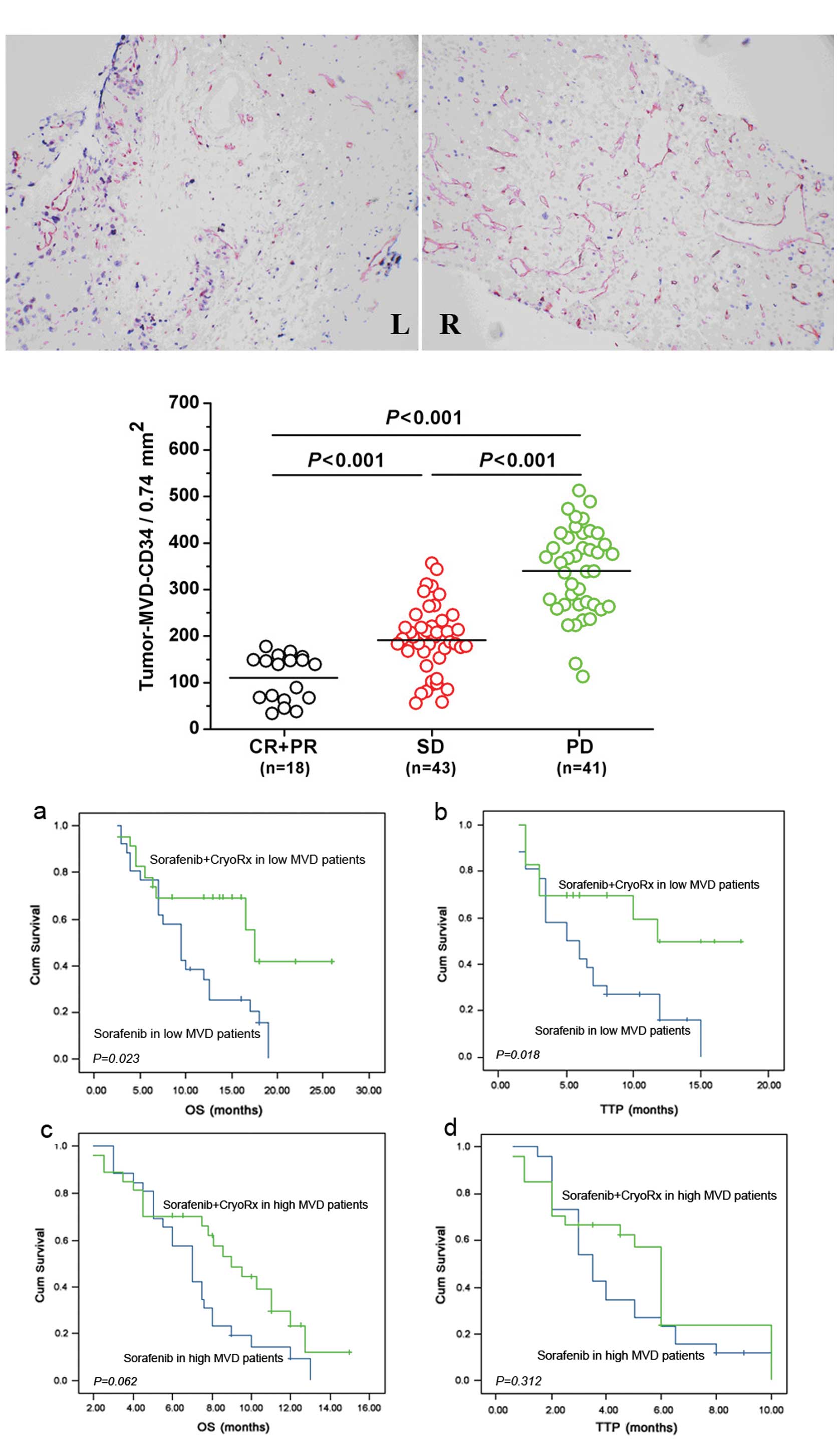|
1.
|
DM ParkinGlobal cancer statistics in the
year 2000Lancet Oncol253343200111905707
|
|
2.
|
ZY TangPerspective of clinical onology
from the viewpoint of liver cancer studiesTumor (China)29142009
|
|
3.
|
HY YooCH PattJF GeschwindThe outcome of
liver transplantation in patients with hepatocellular carcinoma in
the United States between 1988 and 2001: 5-year survival has
improved significantly with timeJ Clin
Oncol2143294335200314581446
|
|
4.
|
HI YangSN LuYF LiawSL YouCA SunLY WangCK
HsiaoPJ ChenDS ChenCJ ChenHepatitis B e antigen and the risk of
hepatocellular carcinomaN Engl J
Med347168174200210.1056/NEJMoa01321512124405
|
|
5.
|
M ShermanHepatocellular carcinoma:
epidemiology, risk factors, and screeningSemin Liver
Dis25143154200510.1055/s-2005-87119415918143
|
|
6.
|
JM LlovetA BurroughsJ BruixHepatocellular
carcinomaLancet36219071917200310.1016/S0140-6736(03)14964-1
|
|
7.
|
JM LlovetA BurroughsJ BruixPrognosis of
hepatocellular carcinoma: the BCLC staging classificationSemin
Liver Dis19329338199910.1055/s-2007-100712210518312
|
|
8.
|
J BruixJM LlovetPrognosis prediction and
treatment strategy in hepatocellular
carcinomaHepatology35519524200210.1053/jhep.2002.3208911870363
|
|
9.
|
J BruixM ShermanManagement of
hepatocellular
carcinomaHepatology4212081236200510.1002/hep.20933
|
|
10.
|
KW ParkJW ParkJI ChoiSurvival analysis of
904 patients with hepatocellular carcinoma in a hepatitis B
virus-endemic areaJ Gastroenterol
Hepatol23467473200810.1111/j.1440-1746.2007.05112.x17764529
|
|
11.
|
JM LlovetJ FusterJ Bruixthe
Barcelona-Clinic Liver Cancer GroupThe Barcelona approach:
diagnosis, staging, and treatment of hepatocellular carcinomaLiver
Transpl10Suppl 1115120200410.1002/lt.2003414762851
|
|
12.
|
AL ChengYK KangZ ChenRandomized phase III
trial of sorafenib versus placebo in Asian patients with advanced
hepatocellular carcinomaLancet
Oncol102534200910.1016/S1470-2045(08)70285-7
|
|
13.
|
JM LlovetS RicciV MazzaferroSHARP
Investigators Study GroupSorafenib in advanced hepatocellular
carcinomaN Engl J Med359378390200810.1056/NEJMoa070885718650514
|
|
14.
|
J FuruseSorafenib for the treatment of
unresectable hepatocellular
carcinomaBiologics2779788200819707458
|
|
15.
|
A HakiméA Hines-PeraltaH PeddiCombination
of radiofrequency ablation with antiangiogenic therapy for tumor
ablation efficacy: study in miceRadiology244464470200717641366
|
|
16.
|
S OsadaH ImaiH TomitaSerum cytokine levels
in response to hepatic cryoablationJ Surg
Oncol95491498200710.1002/jso.2071217219394
|
|
17.
|
G PostonCryosurgery for colorectal liver
metastasesHepatogastroenterol48323324200111379300
|
|
18.
|
FT Lee JrDM MahviSG ChosyGM OnikWS WongPJ
LittrupKA ScanlanHepatic cryosurgery with intraoperative US
guidanceRadiology202624632199710.1148/radiology.202.3.90510059051005
|
|
19.
|
SA ShockPF LaesekeLA SampsonWD LewisTC
Winter IIIJP FineFT LEE JrHepatic hemorrhage caused by percutaneous
tumor ablation: radiofrequency ablation versus cryoablation in a
porcine
modelRadiology236125131200510.1148/radiol.236104053315987968
|
|
20.
|
TD AtwellMA FarrellMR CallstromJW
CharboneauBC LeibovichDE PattersonGK ChowML BlutePercutaneous
cryoablation of 40 solid renal tumors with US guidance and CT
monitoring: initial
experienceRadiology24327683200710.1148/radiol.243105213317329689
|
|
21.
|
W JungraithmayrD BurgerM OlschewskiS
EggsteinCryoablation of malignant liver tumor: results of a single
center studyHepatobiliary Pancreat Dis Int4554560200516286261
|
|
22.
|
J YamamotoT KosugeA SaiuraEffectiveness of
hepatic resection for early-stage hepatocellular carcinoma in
cirrhotic patients: subgroup analysis according to Milan
CriteriaJpn J Clin Ocncol34287295200710.1093/jjco/hym025
|
|
23.
|
R LencioniJM LlovetModified RECIST
(mRECIST) assessment for hepatocellular carcinomaSemin Liver
Dis305260201010.1055/s-0030-124713220175033
|
|
24.
|
A TrottiAD ColevasA SetserCTCAE v 3.0:
development of a comprehensive grading system for the adverse
effects of cancer treatmentSemin Radiat
Oncol13176181200310.1016/S1053-4296(03)00031-6
|
|
25.
|
C WangY LuY ChenY FengL AnX WangS SuW BaiL
ZhouY YangD XuPrognostic factors and recurrence of hepatitis
B-related hepatocellular carcinoma after argon-helium cryoablation:
a prospective studyClin Exp
Metastasis26839848200910.1007/s10585-009-9283-619784786
|
|
26.
|
RT PoonIO NgC LauWC YuZF YangST FanJ
WongTumor microvessel density as a predictor recurrence after
resection of hepatocellular carcinoma: a prospective studyJ Clin
Oncol2017751785200210.1200/JCO.2002.07.08911919234
|
|
27.
|
T YauP ChanKK NgPhase 2 open-label study
of single-agent sorafenib in treating advanced hepatocellular
carcinoma in a hepatitis B-endemic Asian population: presence of
lung metastasis predicts poor
responseCancer115428436200910.1002/cncr.24029
|
|
28.
|
TF GretenF KorangyMP MannsNP
MalekMolecular therapy for the treatment of hepatocellular
carcinomaBr J Cancer1001923200910.1038/sj.bjc.660478419018262
|
|
29.
|
LM ZuroED StarenCryosurgical ablation of
unresectable hepatic tumorsAORN J6423162394419968853781
|
|
30.
|
T ShimizuY SakuharaD AboY HasegawaY
KodamaH EndoH ShiratoK MiyasakaOutcome of MR-guided percutaneous
cryoablation for hepatocellular carcinomaJ Hepatobiliary Pancreat
Surg16816823200910.1007/s00534-009-0124-419466377
|
|
31.
|
JH ShimJW ParkJI ChoiBJ ParkCM
KimPractical efficacy of sorafenib monotherapy for advanced
hepatocellular carcnoma patients in a Hepatitis B virus-endemic
areaJ Cancer Res Clin
Oncol135617625200910.1007/s00432-008-0496-x18846384
|
|
32.
|
M PinterW SieghartI GraziadeiW VogelA
MaieronR KönigsbergA WeissmannG KornekC PlankM
Peck-RadosavljevicSorafenib in unresectable hepatocellular
carcinoma from mild to advanced stage liver
cirrhosisOncologist147076200910.1634/theoncologist.2008-019119144684
|
|
33.
|
RC KaneAT FarrellR MadabushiSorafenib for
the treatment of unresectable hepatocellular
carcinomaOncologist1495100200910.1634/theoncologist.2008-018519144678
|
|
34.
|
J FuruseH IshiiK NakachiPhase I study of
sorafenib in Japanese patients with hepatocellular carcinomaCancer
Sci99159165200817953709
|
|
35.
|
MA WörnsA WeinmannK PfingstSafety and
efficacy of sorafenib in patients with advanced hepatocellular
carcinoma in consideration of concomitant stage of liver cirrhosisJ
Clin Gastroenterol43489495200919247201
|
|
36.
|
B VincenziD SantiniA RussoEarly skin
toxicity as a predictive factor for tumor control in hepatocellular
carcinoma patients treated with
sorafenibOncologist158592201010.1634/theoncologist.2009-014320051477
|
|
37.
|
C SchrammG SchuchAW LohseSorafenib-induced
liver failureAm J
Gastroenterol10321622163200810.1111/j.1572-0241.2008.01982_19.x18796127
|
|
38.
|
D SemelaJF DufourAngiogenesis and
hepatocellular carcinomaJ
Hepatol41864880200410.1016/j.jhep.2004.09.00615519663
|
|
39.
|
L LiuY CaoC ChenSorafenib blocks the
RAF/MEK/ ERK pathway, inhibits tumor angiogenesis, and induces
tumor cell apoptosis in hepatocellular carcinoma model
PLC/PRF/5Cancer
Res661185111858200610.1158/0008-5472.CAN-06-137717178882
|
|
40.
|
M LiH LiC LiL GuoH LiuS ZhouX LiuZ ChenS
ShiJ WeiMA McNuttG LiCytoplasmic alpha-fetoprotein functions as a
co-repressor in RA-RAR signaling to promote the growth of human
hepatoma Bel 7402 cellsCancer
Lett285190199200910.1016/j.canlet.2009.05.01419501957
|
|
41.
|
M LiH LiC LiS ZhouL GuoH LiuW JiangX LiuP
LiMA McNuttG LiAlpha fetoprotein is a novel protein-binding partner
for caspase-3 and blocks the apoptotic signaling pathway in human
hepatoma cellsInt J
Cancer12428452854200910.1002/ijc.2427219267404
|
















